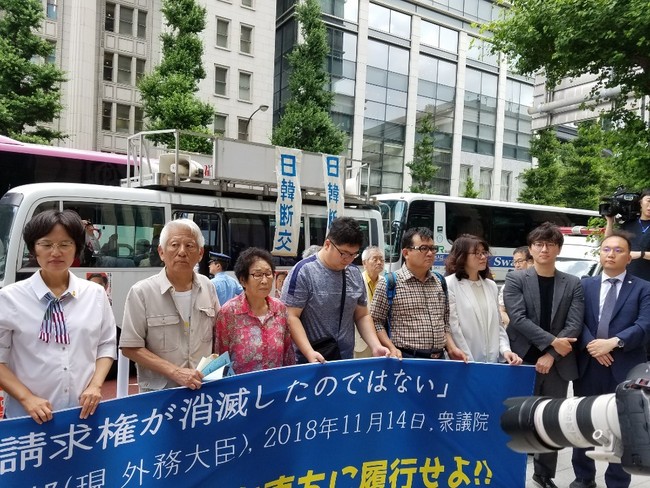Posted on : Jul.2,2019 16:28 KST
 |
|
Yang Geum-deok, 89, was conscripted into forced labor by Mitsubishi Heavy Industries during the Japanese colonial occupation of Korea. However, 73 years later, he still hasn’t received a proper apology, let alone compensation. Yang expressed his frustration with the company in front of Mitsubishi’s headquarters in Tokyo on June 27, saying, “at this rate, I’ll likely leave this life behind with tears in my eyes.”
|
The Japanese government announced economic measures on July 1 in retaliation against a South Korean Supreme Court ruling ordering the payment of compensation to forced labor victims. This economic retaliation – almost without precedent in the history of South Korea-Japan relations – appears poised to plunge the two sides into the kind of confrontation and conflict that they are unlikely to recover from. It is deeply regrettable that Japan has unilaterally moved to make this sort of extreme choice, without even attempting a constructive discussion on the South Korean government’s proposal not long ago to have businesses on both sides voluntarily fund restitution to conscription survivors.
Japan has insisted that its measures are not meant as retaliation, maintaining they are intended for “operation of a suitable export management system.” This argument isn’t fooling anyone. What more needs to be said when Japan’s own press has unanimously proclaimed the measures to be retribution for the forced labor ruling? It is ridiculous that after committing all manner of human rights infringements and illegalities with its forced labor conscription, Japan not only is incapable of apologizing but is now trying to silence demands for compensation via economic retaliation measures. Tokyo should withdraw these petty measures at once.
While hosting the G20 Osaka summit a few days ago, Japan spearheaded the adoption of a joint statement emphasizing “free, fair, non-discriminatory, and transparent trade” and “keeping markets open.” It is deeply hypocritical for it to turn around and, before the ink was even dry on that statement to make a trade issue out of history-related conflicts with no bearing on the economy.
The three items that Japan is subjecting to export regulations as a retaliatory measure – fluorinated polyimides, photoresist, etching gas, and hydrogen fluoride – are essential components for semiconductor and display production. Japan has said it plans to beef up export regulations by removing South Korea from its list of countries with export permit exemptions. With Japan holding global market shares of 70–90% for these materials, domestic companies may face difficulties if the regulations remain in place for the long term. But the Japanese government should also take heed of critics at home who have noted that the measures are likely to have major side effects for Japanese businesses too.
In a statement, the South Korean government said that it would “pursue the necessary response measures according to international and domestic law, including a World Trade Organization complaint.” A resolute response from Seoul appears necessary here. It should take into account the possibility that Japan will not stop here, and do whatever it can to prepare follow-up measures for future retaliation.
Please direct comments or questions to [english@hani.co.kr]








